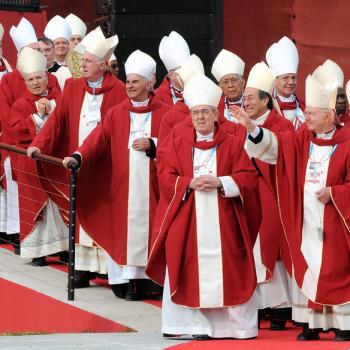Editors' Note: This article is part of the Patheos Public Square on Rites of Passage. Read other perspectives here.
I'm a parent and a Pagan: white, middle-class, living in an urban area of the United States. It probably seems like a simple question to ask how I will pass on my religious values to my son, what rituals will help him cross over into adulthood.
It isn't simple. In fact, it cuts to the heart of some of the painful realities of living as a contemporary Pagan in the United States.
Here's the problem. One of the major projects of contemporary Paganism is to restore the relationship between human beings and the land. We seek to recapture the ethos that can arise when a community lives in a place over centuries and comes to know its animals and its plants and its spirit, intimately. We look back to a time when young people came of age in the context of a community that was more than human. Our rites of passage for young people, then, need to be based on relationship with both other people and the land, and they must involve both obligations and rights.
We are living in a time of rapid climate change, with the certain knowledge that our wealth and our standards of living are not sustainable. For those of us in the United States, our grandchildren — perhaps our children — will need to learn how to live in a lower-tech, less comfortable environment than we enjoy now. Some of them will be at the mercy of the elements in a way most of us no longer understand, even if some of our grandparents or great-grandparents knew it well.
When my husband and I discuss the education of our son, now just a toddler, this global reality is never far from our minds. We want to encourage our son's independence, resilience, creativity, and persistence. We want him outdoors as much as possible, learning to use his body and forming relationships with the animals and plants he finds there. We want him to feel supported and loved, but we also want him able to take care of himself.
Unfortunately, there is little in American parenting culture that supports this kind of education. We are living in an era of "helicopter parenting" where constant supervision of children is the norm, especially in urban and suburban areas. In some cases, children are actively discouraged from learning useful skills that were a part of my childhood, like how to operate the oven or use a sharp knife safely. The kind of childhood that my husband and I both enjoyed, where we roved in groups on our bikes or explored the nearby woods, is not only rare, but in some cases draws harassment from authorities.
The current culture of parenting in the United States assumes that pre-adolescent children are essentially helpless. Any parent with a more nuanced view risks legal repercussions. On Free-Range Kids, reporter and free-range parenting advocate Lenore Skenazy documents case after case of parents being arrested, being interrogated by police or Child Protective Services, or losing custody of their children for allowing them to play outside unsupervised. In a recent case, the Meitivs of Silver Spring, Maryland have been repeatedly harassed by local authorities after allowing their six-year-old and ten-year-old to walk together in their neighborhood. (There is no law against this practice; in fact, the school that the Meitiv children attend requires children who live within a mile of the school to walk, bike, or be driven, as there is no bus service.) The Meitivs announced their intention to sue after local authorities forcibly detained their children for several hours without contacting their parents or providing them food.
How do I pass on my beliefs and values to my child in this environment?
In my childhood, opportunities to take on new real-world responsibilities occurred organically when I interacted with family members and the outdoors. Today, however, most children spend much less time outdoors than I did and many more hours in structured child-focused activities. I've realized that if I want my child to be competent and self-reliant, my husband and I will have to create opportunities for him to learn skills and take on responsibilities in a much more deliberate way than we did. When I imagine my son at twelve years old, I see him able to ride his bike to the store to buy milk; I see him able to catch, clean, and cook a fish over a fire he made; I see him able to mow a lawn, operate a smartphone, care for a dog, and bandage a burn. These skills, and the freedom to use them creatively in times and places of his own choosing, will become the basis of many small rites of passage at which accomplishments are honored and privileges and responsibilities are granted.




